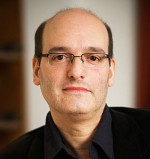Column Name
Title
Born and raised in New York City with summers spent in France with his mother’s relatives, Philip Lasser received his bachelor’s and master’s degree in music from Harvard and Columbia, respectively. In 1994, he earned his D.M.A. from Juilliard, where he studied composition with David Diamond; he also joined the faculty that year. He founded and is the director of the European American Musical Alliance Summer Music Programs in Paris, which, since 1996, has been dedicated to training composers, chamber musicians, and conductors in the pedagogical tradition of Nadia Boulanger. In the composition department, Philip teaches Advanced Counterpoint as well as Advanced Studies in Harmony and Composition for Non-Majors, plus Music in Context and Contrapuntal Analysis in Graduate Studies, and Analytical Methods in the Doctoral Program.
Body
How do you teach someone to compose?
Teaching composition is guiding your students toward a discovery of their own voice. There is no direct way of doing this. I strive to train my students to listen with subtle and discerning ears. We can best discover our own musical language by studying how the greats of the past have dealt with their own challenges. Bach, in the end, can teach us all to be unique.
When did you first know you wanted to be a musician?
I began playing the piano at the age of 5 and soon thereafter was writing songs for my mother, a fine soprano, on the poems I learned at school. Composing has always been as much a part of me as breathing. When I was little, instead of practicing the piano like a “good boy,” I would play chords and sound clusters in a thousand versions, varying their doublings, spacings, and registers to uncover the color and implications of each. I collected these sounds in my mind like perfumes and paints on a palette. They would eventually distill themselves into my writing.
Who was the teacher or mentor who most inspired you?
In 1980, I met Aaron Copland at his 80th birthday celebration. His music had long had a profound influence on me. I was presented to him by a friend as a composer and fellow student of Nadia Boulanger. Despite the hundreds of others who came to celebrate him that day at Symphony Space, Mr. Copland looked deep into my 17-year-old eyes and said, “So you’re a composer are you? Well, the hardest thing to do in composition, but what you must do, is write your heart on the page.” I never forgot that.
What was the first recording that you remember?
It might not have been the first, but the RCA recording (and I mean the LP!) of Rubinstein and the Guarneri Quartet had the most enthralling performances of the Brahms and Schumann Piano Quintets I have ever heard, even to this day. When I was 8 or 9, I remember thinking Brahms was a long-winded, stuffy composer. That all changed when I heard that recording. Brahms has since then been one of my all-time heroes.
What’s the most embarrassing moment you’ve had as a performer or teacher?
I’m at the piano, the Debussy Violin Sonata in front of me, an audience beyond my dear violinist, a subtle upbeat breath for the piano’s enigmatic G-minor chords—along with the entry of the violin melody to the Brahms D-minor Sonata! Fortunately, I am quick with segues, and with a nimble page-turner, the Brahms began with a new introduction. I guess I should have double-checked the concert order!
If you could have your students visit any place in the world, where would it be?
Bryce Canyon. At the setting sun, with its indescribable colors and rock formations, its regal elegance and noble silence, the place is of enormous inspirational power.
What’s been the biggest change in your students since you started teaching?
I have been amazed at the increasing level of work and commitment from my students both here and at my summer program. I am blessed to be surrounded by devoted musicians who seek to learn with such honesty and integrity.
What are your nonmusic interests or hobbies?
I have recently installed a door at my house in Putnam County. For those who have never hung a door, it is definitely up there in complexity with counterpoint and Newtonian physics!
What would people be surprised to know about you?
That I hung a door? Perhaps also that I write poetry.
Which is harder, writing poetry or composing?
It takes less time to write a poem as, for me anyway, they’re rarely very long. But in the realm of the underlying message, what I call its utterance, it is easier to create pure meaning in music since notes and rhythms are free from direct connotation to real things—a B flat, for example, by itself does not represent anything in the outside world. Poetry on the other hand, uses words that are laden with pre-existing meaning in the mind of the listener.
What book are you reading?
I recently read Nicole Krauss’s The History of Love. It is a sensitive story where identity is the focus and meaning is uttered above the words and beyond the storyline.
Do you follow any social media? If so, what do you follow and why?
No. I hold fast to the old notion that friends are people you actually know!
If you weren’t in the career you are in, what would you be doing?
Most likely, I would be a writer or poet.





